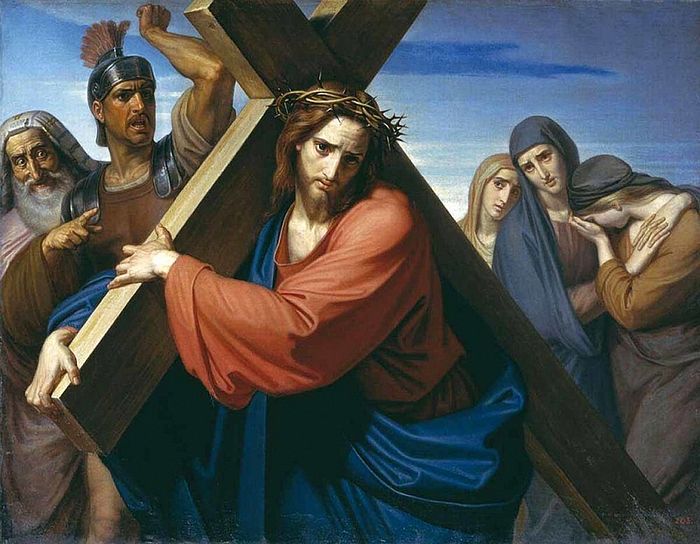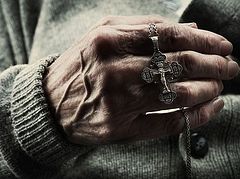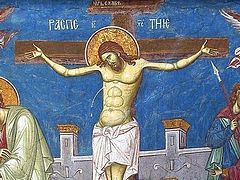The Cross of Christ consisted of two bars of wood which were nailed together at right angles by someone in obedience to an order from the unscrupulous judges of Christ. He joined them in order to crucify upon them the Saviour of the world, the “gentle and humble of heart” (Matthew 11:29), the one who was spat upon, reviled, struck and tormented.
But “When he was insulted, he returned no insult. When he was made to suffer, he returned no threats” (1 Peter 2:23). The carpenter who cut the planks, the servant who nailed them together and the judges who pronounced sentence-none of these had the vaguest idea of importance of the event or of the cross. These two pieces were raised at the juncture of history, dividing the world into two periods of time-the eras before and after the redemption of Christ.
The Cross of Christ is a symbol of the great moral, spiritual and religious importance. It stands for the crucifixion of Christ, the unfathomable mystery of the Passion and death of the God-Man on Golgotha. Only by means of the Cross can the supreme mystery of the Incarnation be penetrated, or the mystery of the redemption of mankind.
St John Chrysostom says,
“The Cross, is wood which lifts us up and makes us great... The Cross uprooted us from the depths of evil and elevated us to the summit of virtue”.
The study of the Cross, of the great drama enacted on Golgotha, raises man up to the level of angels.
“You made him for a little while lower than the angels; you crowned him with glory and honour, and put all things under his feet” (Hebrews 2:7).
When man devotes his efforts to a serious contemplation of the mystery of the Cross, he is lifted up, raised in comprehension and conception; he becomes tender and gentle in thought and feeling, humble in his achievements. meek in his behaviour. Armed with the weapon of the Cross and furnished with immaterial wings of superhuman power, inspired by the Holy Spirit, he reaches the dizzying heights of Christian virtue and enters that state which St. Paul describes saying,
“The life I live is not my own; Christ is living in me” (Galatians 2:20).
The Cross has another meaning: the crucifixion, the subjugation, the annihilation of our passions; the rejection and uprooting of any feeling or intention which does not conform with the ideals of Christ. Whatever does not comply with the Spirit of Christ should be cast far away from us. Therefore the cross is inlaid with depictions of the sufferings and persecutions of Christ and all Christians.
“It was for this you were called, since Christ suffered for you in just this way and left you an example, to have you follow in His footsteps” (1 Peter 2:21).
We suffer for the truth when we are scorned for being righteous, when we are persecuted for virtue, when we become imitators of Christ.
“Blessed are those persecuted for righteousness’ sake; the kingdom of God is theirs” (Matthew 5:10).
He also said,
“If you wish to be a follower of the Crucified One, dear brother, you must take up your cross and prepare yourself for a life of deprivation, sacrifice and struggle. Do not lose courage. Let not your hearts be troubled. Have faith in God and faith in Me... Do not be distressed or fearful” (John 14:1,27).
Continue along your road, even though it is an uphill path and very tiring. But when you feel despondent, do not lose your patience, but look to the Cross of Christ. Keep in mind the words of St. Paul,
“No task has been sent you that does not come to all men. Besides, God keeps His promise. He will not let you be tested beyond your strength. Along with the test He will give you a way out of it so that you may be able to endure it” (1 Corinthians 10:13).
Christian virtue is linked with pain and self-sacrifice, but also with joy and peace of mind. When the Christian suffers for the sake of the truth and righteousness, then he must understand that he suffers for Him Who said,
“I am the Way, the Truth and the Life”.
For this reason we must joyfully follow Christ, repeating the words of St. Paul,
“It is your special privilege to take Christ’s part-not only to believe in him, but also to suffer for him” (Phil. 1:29).
The Christian suffers, is subjected to torments, is crucified and dies in order not to lose his higher spiritual and moral values, which give honour and meaning to man’s life. He has found that goal at the end of the road, that blessedness to which the Lord referred when he said,
“What profit would a man show if he were to gain the whole world and destroy himself in the process?” (Matthew 16:26).
We are not alone on our road, we have the words of the Lord, “Do not be troubled, I am not leaving you like orphans”. He follows us in each of our sufferings. Let us pray that he will bestow on us a little of the mysterious sanctifying power of his Cross, which is so great that it breaks and destroys mountains of evil and unrighteousness and spreads the benefits of truth and godliness throughout the world.




